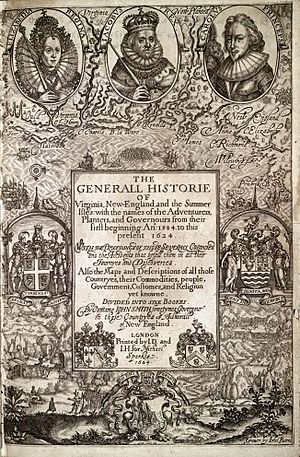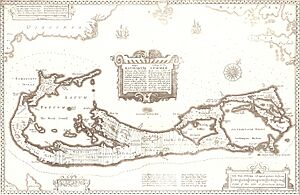Somers Isles Company facts for kids
The Somers Isles Company was a business group formed in 1615. Its main job was to manage and make money from the English colony of the Somers Isles, which we know today as Bermuda. This company had a special permission from the King (called a royal charter) to run Bermuda until 1684. After that, the King took over, and Bermuda became a direct royal colony of England.
Contents
Bermuda's Early Days with the Virginia Company
Bermuda was first settled by accident in 1609. A ship called the Sea Venture was part of the Virginia Company. This company was trying to supply its settlement in Jamestown. The Sea Venture was caught in a terrible storm and crashed on Bermuda's reefs.
The leader of the company, Sir George Somers, purposely steered the ship onto the reefs. This saved everyone on board from drowning. The settlers and sailors stayed on Bermuda for ten months. They built two new ships, named Deliverance and Patience, to continue their journey to Jamestown.
When they finally sailed to Jamestown, they left some people behind in Bermuda. These people were meant to hold England's claim to the islands. Among those who continued to Jamestown were Sir Thomas Gates, who would become governor of Jamestown. Also on board was William Strachey, whose story of the shipwreck might have inspired Shakespeare's play The Tempest. John Rolfe, who later started Virginia's tobacco industry, also left Bermuda. He had buried his wife and child there.
When they reached Jamestown, the settlement was in a very bad state. Only sixty people were left out of five hundred. They almost decided to give up and go back to England. But then, another supply fleet arrived from England, saving the colony. However, this also meant more people needed food.
Sir George Somers went back to Bermuda on the ship Patience to get more supplies for Jamestown. Sadly, he died in Bermuda in 1610. His nephew, Matthew Somers, then sailed the Patience to England instead of Virginia. He wanted to claim his inheritance.
When news of the Sea Venture's survival reached England, the Virginia Company's royal charter was changed. On March 12, 1612, Bermuda was officially added to their lands. The new colony was first called Virgineola. But soon, it was renamed The Somers Isles or The Somers Islands to honor Sir George Somers.
In 1612, the first Governor of Bermuda, Richard Moore, arrived with more settlers on a ship called Plough. These new settlers were mostly tenant farmers. They agreed to work for the Company for seven years to pay for their journey. The Company hoped to make money from farming. But early governors also tried to find other ways to make money, like pearl diving. (Even though there were no pearls in Bermuda!) The first two enslaved people brought to Bermuda were skilled pearl divers.
Unlike Jamestown, which faced many wars and hardships, Bermuda did well from the start. It never made a huge profit for its investors, but its population grew quickly. It even grew faster than Jamestown. Some people even thought about moving all the Jamestown settlers to Bermuda.
Starting the Somers Isles Company
The Virginia Company managed Bermuda until 1613. Then, the colony was briefly transferred to another person, Sir William Wade, for £2,000. He then gave it back to the King in 1614. For a short time, the King directly controlled Bermuda.
Then, in 1615, the same investors (shareholders) from the Virginia Company formed a new company. This was the Somers Isles Company. Bermuda was then given to this new company. The Virginia Company itself was shut down in 1622. Its main colony in Virginia then became a royal colony. But the Somers Isles Company, with its own special charter, kept running Bermuda for another sixty years.
The first investors in the Somers Isles Company were mostly the same people who invested in the Virginia Company. They were often wealthy and important people in England.
Bermuda as a Company Colony
Most of Bermuda was divided into eight equal parts called tribes, which later became known as parishes. These areas were named after the Company's shareholders. Each tribe was further divided into smaller plots of land. These plots were like shares in the Company. The Company made money from the crops grown on this land.
There was also a ninth area, now called Saint George's. This area included Saint George's Island, Saint David's Island, and other smaller islands. This land was kept as "common" or "King's" land and was not divided up for the Company to use. This is where the capital town, Saint George's Town, was located. This spot was chosen because it had the only harbors that ships could easily reach back then.
A surveyor named Richard Norwood was hired to map the colony in 1616. He also counted the population. He found that the land in the eight commercial parishes was bigger than they thought. The Governor, Daniel Tucker, took some of this extra land for himself.
Local Government in Bermuda
The Somers Isles Company continued to appoint governors for Bermuda until it was dissolved in 1684. However, in 1620, a local parliament was created. This was called the House of Assembly. Only men who owned land could vote. There was no upper house like in England. Instead, a council of appointed members, mostly from the leading merchant families, became very powerful. They often had more real power than the governor.
The first governors were very worried about attacks from Spain or the Netherlands. So, they spent a lot of time building forts and training local defense groups called militias. This continued throughout the Company's rule. Captain John Smith even came to Bermuda to check on the island's defenses.
People and Immigration
During the Company's rule, many European indentured servants came to Bermuda. These were people who agreed to work for a certain number of years to pay for their trip to the island. This cheap labor meant Bermuda didn't rely as much on slavery as other European colonies in the West Indies.
Most Bermudians were of English background. But other groups also came to the island. The first were Irish and Scottish indentured servants. Many of these were prisoners of war captured during conflicts in England.
The second group were Native Americans from North America. They were brought to Bermuda as slaves after being captured in wars in colonial New England. The third group were Africans. Some were free people from Spanish colonies, but most were brought by European slave traders as part of the transatlantic slave trade. As more Africans arrived, the white majority became concerned. The time African indentured servants had to work was increased from seven years to ninety-nine years.
During the English Civil War (1642–1651), Bermuda mostly supported the King (Royalists). This might be because the Company's investors were wealthy upper-class people who supported the King. Even though the Royalists lost the war, Bermuda was mostly unaffected. Supporters of the Parliament (Roundheads) in Bermuda were forced to leave. They became the Eleutheran Adventurers and settled on the island of Eleuthera in the Bahamas.
Economy and Industries
Agriculture was the main way Bermuda made money under the Somers Isles Company. The main crop they tried to grow for export was tobacco. But the tobacco was not very good quality, and they didn't grow much of it. People even said the special Bermuda cedar boxes used to ship the tobacco were worth more than the tobacco inside!
Bermuda also had trouble with other export crops. Each farmer had only a small area to farm compared to other colonies. They had to grow crops almost all year, which wore out the soil. By the 1620s, other colonies like Virginia were growing a lot more tobacco. This made Bermuda's tobacco less profitable. So, Bermudian farmers started growing more food crops and raising animals. This helped them rely less on expensive imported food. They also started selling food to other colonies. This growing trade meant they needed their own ships to deliver their goods.
Bermudians soon started to move away from farming. They began building boats and developing a special type of ship called the Bermuda sloop. They wanted to become involved in sea-based trades. The Company didn't like this because it only made money from tobacco shipped to England. So, the Company tried to stop these activities. They banned building ships without a license. They also passed laws to protect the Bermuda cedar trees. These laws might have been more about stopping shipbuilding than saving trees.
Civil War and Bermuda
By the 1630s, the Company stopped sending governors from England. Instead, they started appointing important Bermudians, like William Sayle, to the role. Since few of the Company's investors actually lived in Bermuda, the local House of Assembly was elected by islanders. This meant the Assembly cared more about the people living in Bermuda than the investors in England.
By the mid-1600s, with tobacco sales failing, many English investors sold their shares to the farmers who lived on the land. Bermudians quickly became the main landowners. However, the investors still in England kept control of the Company. They did this by saying that only shareholders who came to meetings in England could make decisions. Many of these English shareholders supported the Parliament during the English Civil War (1642–1651).
Because of the growing problems between Bermudians and the Company, most Bermudians sided with the King (Royalists). With control of the military and the Assembly in Bermuda, the Royalists removed the Company's appointed Governor, Captain Thomas Turner. They elected John Trimigham instead. The colony's Independents, who supported Parliament, were forced to leave. They settled in the Bahamas under William Sayle, who was loyal to Parliament.
In response to Bermuda's (and other colonies') support for the King, Parliament passed a law in October 1650. This law, called An Act for prohibiting Trade with the Barbadoes, Virginia, Bermuda and Antego, said that anyone who helped these "rebellious" colonies was a traitor. It banned all trade with Bermuda, Virginia, Barbados, and Antigua.
Parliament also allowed private ships to attack English vessels trading with these colonies. They prepared to invade the Royalist colonies. But then, the Second Anglo-Dutch War started in 1651, involving the British West Indies in war with France and Holland. Bermuda, being far away, was not affected by that war. It eventually reached an agreement with Parliament.
When the King was restored to power in England (the Restoration), Bermudians found a strong ally. The King also wanted to take control of the English Empire away from companies like the Somers Isles Company.
End of the Company's Rule
The Company's increasing interference in the lives of the islanders led to its downfall. Bermudians complained to the King about how the Company was treating them and how it was mismanaging the colony. This led to a long court case where the King supported the Bermudians against the Company.
In 1684, the Company's Royal Charter was taken away. From then on, the King was responsible for appointing Bermuda's governors. (The King even re-appointed the last Company governor). Once freed from the Company's rules, the local merchant class became very powerful. Bermudians largely stopped farming and focused on sea-based trades.
|
 | Shirley Ann Jackson |
 | Garett Morgan |
 | J. Ernest Wilkins Jr. |
 | Elijah McCoy |



